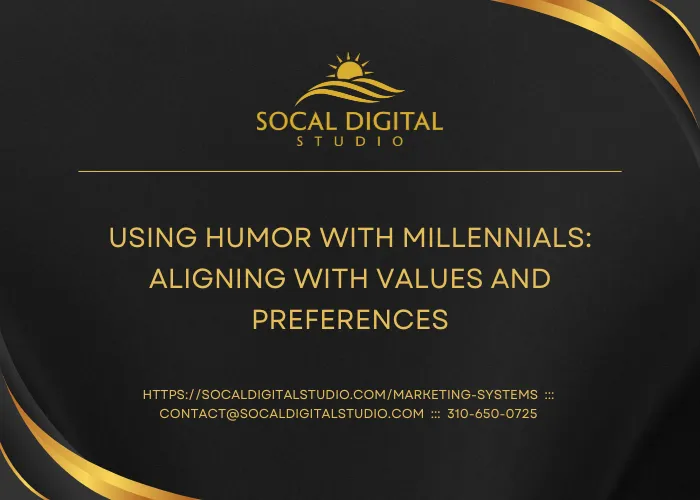PROPELLING SUCCESSFUL BUSINESSES
Actionable Best Practices

Using Humor with Millennials: Aligning with Values and Preferences
"There is a thin line that separates laughter and pain, comedy and tragedy, humor and hurt." - Erma Bombeck
Introduction
Millennials, born between 1981 and 1996, have grown up in an era of rapid technological advancement and social change. They value authenticity, inclusivity, and social responsibility. Humor that resonates with millennials often incorporates these values, reflects their digital-savvy nature, and engages with contemporary cultural references.

Strategies for Using Humor Effectively
Authenticity and Relatability: Millennials value genuine, relatable content. Humor that reflects real-life experiences and emotions tends to resonate well.
Example: The popular Twitter account of Wendy's is a great example of authentic humor. Wendy’s uses a witty, conversational tone that engages followers by responding to them in a humorous and authentic manner.
Inclusivity and Social Awareness: Millennials appreciate brands that are socially conscious. Humor that subtly incorporates social issues can appeal to their values.
Example: Ben & Jerry's often uses humor in their campaigns to address serious social issues in a way that is both engaging and thought-provoking. Their “Justice ReMix’d” flavor campaign is a notable example, blending humor with a message about criminal justice reform.
Self-Deprecating and Humble: Millennials appreciate brands that don’t take themselves too seriously. Self-deprecating humor can make a brand appear more approachable and relatable.
Example: The Dollar Shave Club’s launch video, “Our Blades Are F***ing Great,” uses self-deprecating humor to showcase their product. The founder’s candid, humorous approach made the brand seem down-to-earth and trustworthy.
Pop Culture and Meme References: Millennials are highly engaged with pop culture and internet memes. Incorporating these elements can make humor more relatable and shareable.
Example: Netflix’s social media strategy includes frequent references to popular shows, movies, and internet culture, making their content highly relatable to millennials. Their use of memes and gifs in social media posts effectively engages their audience.
When Humor Alienates Millennials
Conversely, humor can alienate millennials if it appears inauthentic, offensive, or out of touch with their values and culture. Here are some common pitfalls:
Inauthenticity: Millennials can quickly detect when a brand is being disingenuous. Humor that feels forced or inauthentic can backfire.
Example: Pepsi’s 2017 ad featuring Kendall Jenner attempting to use protest imagery for commercial gain was widely criticized as inauthentic and exploitative. The ad was perceived as a shallow attempt to connect with social issues, leading to significant backlash.
Insensitive or Offensive Content: Humor that is perceived as offensive or insensitive to social issues can alienate millennials, who value inclusivity and social justice.
Example: H&M faced backlash for an ad featuring a black child wearing a hoodie with the slogan “Coolest Monkey in the Jungle.” The insensitivity of the ad sparked outrage and led to accusations of racism, causing harm to the brand’s reputation.
Ignoring Diversity: Millennials value diversity and inclusivity. Humor that fails to represent diverse perspectives or perpetuates stereotypes can be off-putting.
Example: Brands that use humor based on outdated stereotypes or that fail to represent diverse communities can alienate millennials. An ad campaign that only features one type of person or fails to be inclusive might be seen as out of touch.
Being Out of Touch with Digital Culture: Humor that misuses or misunderstands internet culture can come across as out of touch.
Example: Brands attempting to use memes without fully understanding the context or misusing internet slang can appear inauthentic and awkward. An example is Microsoft's attempt to use outdated meme formats, which was seen as trying too hard to be “cool.”
Conclusion
Humor can be an effective tool in marketing to millennials if it aligns with their values and preferences. Authenticity, relatability, social awareness, and cultural relevance are key components of humor that resonates with this generation. Conversely, inauthentic, insensitive, or out-of-touch humor can alienate millennials and harm a brand’s reputation. By understanding and respecting the values and culture of millennials, brands can create humorous content that engages and connects with this influential demographic.
Disclaimer and Caution on General Characterizations and Generational Profiles
While general characterizations and generational profiles can offer valuable insights into common trends and behaviors within specific groups, it is important to approach these profiles with caution.
Usefulness
Generalizations can help in understanding broad patterns and tendencies, facilitating the development of targeted marketing strategies, communication methods, and policy-making.
Generational profiles, such as those of Baby Boomers, Gen X, Millennials, and Gen Z, can provide useful frameworks for understanding different perspectives, values, and preferences that may influence behavior and decision-making.
Pitfalls
Overgeneralization: Not all individuals within a group or generation will fit the characterized mold. There is significant diversity within any demographic, and individual differences can be substantial.
Stereotyping: Relying too heavily on generalizations can lead to stereotyping, which can perpetuate misconceptions and biases, resulting in unfair treatment or exclusion of individuals who do not conform to the stereotype.
Context Ignorance: General characterizations may overlook important contextual factors such as cultural, socio-economic, and geographical differences that influence behavior and attitudes.
Inaccuracy: Profiles can be based on outdated or incomplete data, leading to inaccuracies that misinform decisions and strategies.
In Sum
While general characterizations and generational profiles are useful tools for gaining a broad understanding of different groups, they should be used judiciously. Always complement these insights with specific, contextual information and remain vigilant against the risks of overgeneralization and stereotyping. A nuanced approach that respects individual diversity and avoids assumptions will yield more effective and respectful outcomes.
We Help You Effectively Use Humor to Align with Your Brand
Schedule a free impact and strategic session with us by CLICKING HERE and uncover opportunities to increase your website's traffic and engage with your target audience more meaningfully with tempered use of humor and storytelling so they will want to do business with you.
Recommended Reading: "The Content Beast" by Geoffrey Klein.

SUBSCRIBE TO THIS NEWSLETTER TO STAY IN THE KNOW
Please contact us with topics you would like us to cover
Dominate with Our Affordable All-in-One Marketing System
SoCal Digital Studio's Advanced All-In-One Marketing System is built to help local businesses attract, engage, convert, and retain customers with speed and consistency. It automates the communication that is essential to a business' success and continuing growth. Request a free marketing audit to uncover weaknesses and use SoCal Digital Studio's Marketing System to not only compete, but dominate the market.
All-in-One Marketing System
Leverage Powerful Marketing Tools and Sales Funnels to Nurture and Convert Customers at an Affordable Price
Our marketing system has it all and allows you to (1) capture leads via landing pages, forms, calendars, and inbound phone calls; (2) message leads via phone calls, SMS, emails, and Messenger; and (3) close leads with built-in tools for payments and analytics (including call tracking).You can also create landing pages and funnels, set up automated follow-up campaigns, schedule appointments, fine-tune marketing and sales processes, and manage all of it so nothing slips between the cracks in your dedicated marketing system.
Stellar Package
Monthly Subscription
12-Month Subscription is $4970
One-Time Set-Up Fee Varies
$297
Full System Access
5,000 Contacts
1,500 SMS or Calls
15,000 Emails
1-3 Team Members
Galactic Package
Monthly Subscription
12-Month Subscription is $6970
One-Time Set-Up Fee Varies
$497
Full System Access
7,500 Contacts
3,000 SMS or Calls
30,000 Emails
4-10 Team Members
Cosmic Package
Monthly Subscription
12-Month Subscription Is $9970
One-Time Set-Up Fee Varies
$697
Full System Access
10,000 Contacts
4,500 SMS or Calls
45,000 Emails
11-15 Team Members
